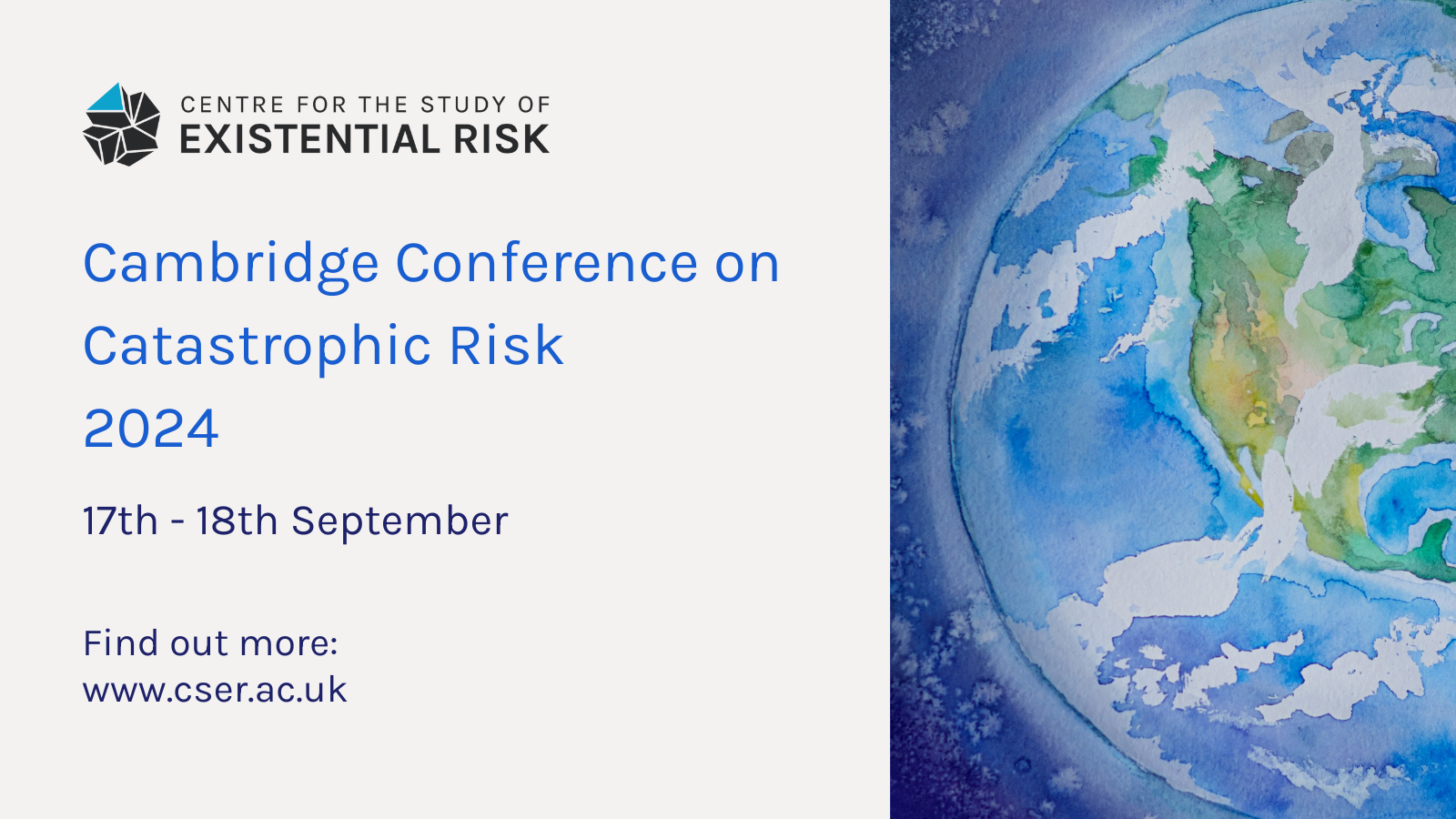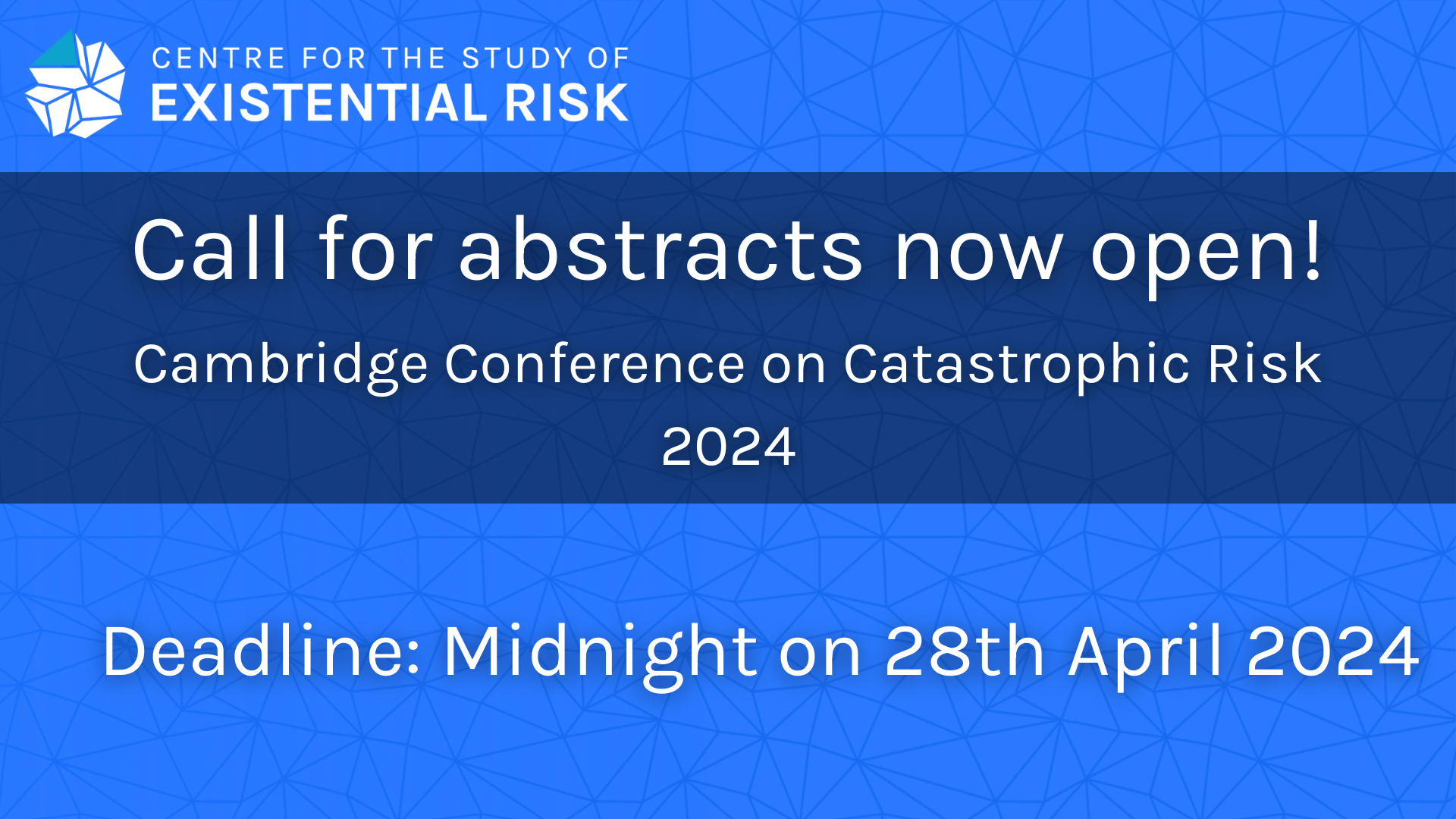Since 2016, CSER has held a biannual conference aimed at fostering the field of global catastrophic risk studies. Having established a close network of researchers, many of whom contributed to the recent collection of essays on the Era of Global Risk, this year’s event aims to grow that community further.
Contents:

Conference overview
The Centre for the Study of Existential Risk is pleased to invite abstract submissions for the 2024 Cambridge Conference on Catastrophic Risk to be held in-person in Cambridge on the 17-18th September 2024.
The conference aims to break silos between different communities and to share experiences and approaches to studying, governing, mitigating and preventing global catastrophic risks.
This is a highly interdisciplinary conference and we therefore welcome contributions from students, researchers, practitioners and policymakers from across disciplines and perspectives. We particularly encourage submissions from early career researchers and from participants that have not engaged with CSER before.
At the same time as launching this call for abstracts, CSER researchers and others that study catastrophic and existential risk signed a statement of essential principles for long-term survival - for this field of study and the humans and environment that it hopes to protect.
Read more about CSER's previous conferences here
Please note: Attendee registration will open in the summer
Call for abstracts

Abstract submissions are welcomed to the following topical sessions:
Conference sessions:
- Systemic risk and global catastrophic risk
Humanity faces substantial global catastrophic risk (GCR), with frequently discussed threats including climate change, nuclear war, pandemics, and transformative artificial intelligence. Yet such risk exists within an increasingly complex and interconnected global risk landscape, in which risk drivers interact with each other and localised shocks can lead to cascading nonlinear impacts. The study of systemic risk (as well as of related ideas such as polycrisis) aims to capture this behaviour, but work at the intersection of systemic risk and GCR has so far been limited. This session invites abstracts broadly exploring this intersection. Questions of particular interest include: how do systemic interactions contribute to the risk of globally catastrophic outcomes, what can systemic risk research and GCR research learn from each other, and how can a “systemic lens”, focussing on connectivity in and between systems, be helpful in assessing and mitigating GCR? We welcome submissions from a wide range of disciplines: perspectives from GCR research, systemic risk analysis, natural and social sciences, and humanities are all welcome.
- What might history tell us about the future of existential and catastrophic risk studies?
The field of global catastrophic risk studies has long depended on historical insights to put future threats into perspective. But this has typically been limited to “big history” over extremely long time spans. This session will provide a forum for discussing the many ways historical research can enhance our ability to prepare for future crises. We seek scholars specialising in different forms of global risk, including (but not limited to) climate change, environmental hazards, nuclear technologies, food insecurity, pandemics, armed conflicts, and illiberal politics. We invite submissions that speak to one or more of the session’s key themes. These include the risks posed by the anthropogenic transformation of the planet; social movements and/or academic research fields that laid the historical foundations for the field of global catastrophic risk studies; and how more focused historical scholarship on risk and disasters can inform “big histories” of these topics. - Emerging technical and scientific challenges and solutions
The field of existential and catastrophic global risk is sometimes perceived as focusing on a small number of hazards. However, analysis of a variety of pathways for escalating risk shows us that previously under-appreciated hazards could have catastrophic impacts as well, but remain comparatively understudied. This session invites submissions on the topics of emergence and risk, whether that is taken to mean areas where there is emerging technical knowledge, or where the risks and possible solutions themselves are only just emerging. These might include:
- Non-traditional hazard areas – especially ‘slow-moving disasters’ - where there is already a strong knowledge base but not one that has previously been connected to global catastrophic risk (eg. antimicrobial resistance or environmental pollution)
- Evidence-based assessments of areas of convergence between risks, such as AI and biological risk
- Poorly-understood areas of governance, where new evidence may provide opportunities for intervention. - Global catastrophic risk reduction, response and resilience
Global catastrophic risks (GCRs) are often neglected in discussions of disaster risk management at both national and international levels. However, with increased attention to high-impact risks in the aftermath of the COVID-19 pandemic, more attention is being paid to better preparing for high-impact risks. Global-scale challenges such as these require international cooperation for risk assessment, governance, and risk management, and these processes are rarely sensitive to the dynamic nature of risk or the local contexts where they manifest. In this session, we ask, what is the current state-of-the-art for GCR disaster risk reduction, and how can we better prepare for global catastrophes? We invite submissions that address how GCRs could or should be incorporated into the mainstream plans for international disaster risk reduction and how we can design more inclusive forms of resilience and response sensitive to differences in vulnerability, equity, and cultural norms. - Intergovernmental governance of global catastrophic risks
Global catastrophic risks (GCRs) are becoming a salient transnational challenge. Governments and other actors (including NGOs) are devising and implementing governance strategies to address these risks at national, regional and international levels. As such, intergovernmental cooperation is a key feature of the emergent regime for the governance of GCRs. Against this backdrop, this session will critically examine the architecture and effectiveness of intergovernmental governance of GCRs. The session will be organised around three questions: i) How does the architecture of global governance create, manipulate, and mitigate catastrophic risk? ii) How could regimes for the governance of catastrophic risks be (re)designed to be more responsive to a wider range of expertise? and iii) How could regimes support and enhance a more just and equal world? - Open poster session
These can include posters on any topic relevant to catastrophic risk, particularly those that we have not been able to include in our sessions such as research methods and tools, as well as the philosophical and conceptual foundations of this field.
We are inviting submissions of both oral (12 minutes) and poster presentations.
Format of abstract:
The abstract should be a maximum of 300 words (1800 characters) in length. Please clearly indicate the session for which you are submitting the abstract and your preference for an oral or poster. Additionally, the abstract should include a descriptive title, name of the main author, co-authors and their respective affiliations.
Please note that each person can only submit one abstract as the main author and due to a limited availability of oral talks, it may not be possible to meet your preferred talk format.
Letters of acceptance or rejection will be sent to the main author by 27th May 2024
Busaries
Speakers will be expected to pay a conference fee and attend the conference in-person:
- Full Conference package: £160
- Ticket without dinner: £120
- Student full conference package: £110
- Student ticket without dinner: £80
There are a limited number of needs-assessed bursaries available to all attendees to assist with tickets costs, visas, travel or accommodation. Applications for these will open once abstracts have been accepted.
Further Information
Date: 17th - 18th September 2024
Location: The conference is being held in-person in central Cambridge, UK.
If you have any questions about the Conference, please email events@cser.cam.ac.uk